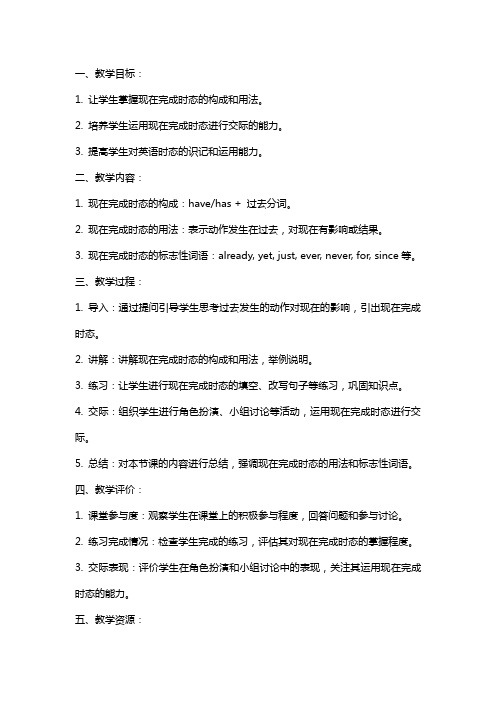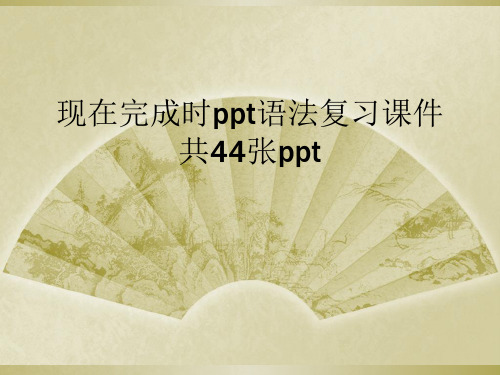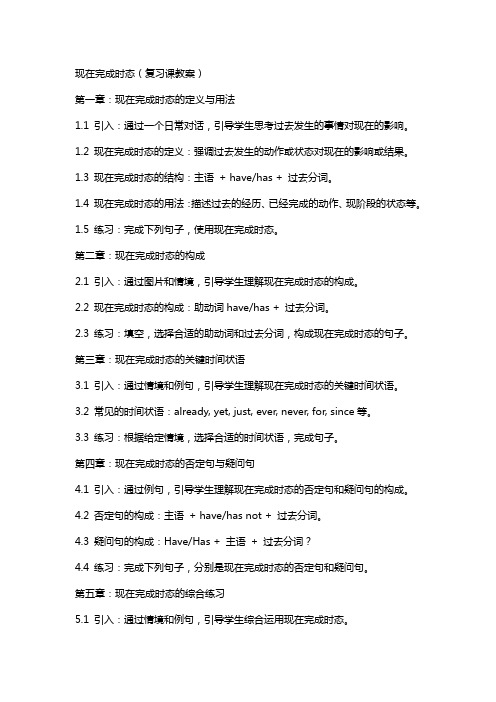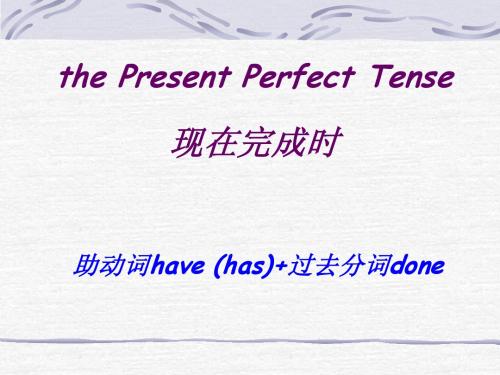现在完成时复习
复习复习现在完成时

动词过去分词 的规则变化规律
双写+ed
注:以一个辅音字母结尾 的重读闭音节词,双写最
后一个辅音字母+ed
study studied studied
carry carried carried
变y为i,+ed
try tried tried
注:以辅音字母+y结尾, 变y为i,+ed.
play played played enjoy enjoyed enjoyed stay stayed stayed
ABA型
(原形与过去 分词相同)
take go do see is/am
/are
took taken
went gone
did
done
saw seen
was been
/were
ABC型 (三种都不一样)
the West Lake
the Great Wall
A: I have been to the West Lake.
直接+ed
注:以元音字母+y结尾, 直接+ed.
写出下列动词的过去式和过去分词:
原形 过去式 过去分词 shut shut shut
动词过去分词 的不规则变化
cut cut cost cost
cut cost
AAA型 (三种都一样)
put put
put
make have keep find buy
Have you ever loved somebody So much it makes you cry Have you ever needed something so bad You can't sleep at night Have you ever tried to find the words But they don't come out right Have you ever Have you ever Have you ever been in love Been in love so bad You'd do anything To make them understand Have you ever had someone Steal your heart away You'd give anything To make them feel the same
初中英语语法复习——现在完成时课件

teach(教) taught
bring(带来) brought
fight (战斗) fought
buy(买)
bought
think(想)
thought
hear (听见) heard
sell(卖)
sold
tell(告诉)
told
meant caught taught brought fought bought
hang(悬挂) hung hung
hold(抓住) held
held
sit(坐)
sat
sat
babysit(临时照顾)babysat babysat
win (赢) won
won
meet(遇见) met keep (保持) kept sleep(睡) slept sweep(扫) swept feel(感觉) felt leave(离开) left build(建设) built send (传送) sent spend(花费) spent lose (丢失) lost
二、 AAB型(动词原形与过去式同形)
beat(跳动) beat beaten
三、 ABA型(动词原形与过去分词同形)
become(变成) became become
come(来) came come
run(跑)
ran run
四、 ABB型(过去式与过去分词同形)
get(得到) got
got
hang(吊死) hanged hanged
give(给)
gave given
take(取)
took
taken
mistake(弄错) mistook mistaken
英语语法教学 现在完成时复习

简析:现在完成时的时间状语常有如下 四类:
⑴ 现在完成时常与already(已经),just (刚 刚,正好),ever(曾经),never (从来,也不;从不),before(以前), yet(仍然)等连用。
⑵现在完成时常与recently(近来), so far(到目前为止),in the past/“last + 一段时间”等时间状语连 用。因为上述短语表示的是从现在起往 前推算的一段时间,句中的动作是从过 去某一时间或时刻开始持续到现在的。
1. have/has been to表示“过去曾去过 某地”,但现在已经回来了。
2. have/has gone to表示“已去了某 地”,现在还没有回来。
3. have/has been in 表示“已在某地 (呆了多久)”,如果是小地方用at代替in。
四、中考考点:
考点一:考查基本概念
例如: Both his parents look sad .
am/is-was-been
are-were-been
begin-began-begun break-broke-broken
do-did-done
draw-drew-drawn
drink-drank-drunk drive-drove-driven
eat-ate-eaten
fall-fell-fallen
⑶现在完成时时常与“for +时间段或 since +过去时间点”连用(含从句,从句 过去时)。
⑷现在完成时还与once(一次), twice(两次),three times(三次), several times(几次)等表示重复次数的 词语连用。
考点三:考查与一般过去时的区别
2024年中考英语语法复习+—现在完成时课件

Have you seen the doctor? 你看过医生了吗?
在现在完成时中,当主语是I/you/we/they时,助动词用 have;当主语是第三人称单数时,助动词用has。
三、现在完成时的使用
1.表示过去发生并结束的动作对现在所产生的影响
He has left the city. 他已离开了这个城市。(结果:他不在这个城市。)
一、基本构成:have/has+done
I have finished my homework. 我已完成了作业。 (这里的finished就是动词finish的 过去分词。)
二、现在完成时不同人称的用法 I have washed my car.我洗过车子了。
We have done the whole work.我们干完了所有活儿。
A.practised
B.were practising C.have been practising
C
3 . —Where is mother?
—She is in the kitchen. She ________ the
housework all morning.
A.is doing
B.was doing
B.was studying
C.studied
D.have been studying
D
15 . “I _____ as everyone expects ”, Yao Ming
said .
A.haven’t played
B.haven’t been playing
C.didn’t play
D.am not playing
现在完成时的用法讲解

现在完成时的用法复习整理一、谓语部分结构:助动词have (has) +过去分词过去分词的构成分规则的和不规则的,规则的与过去式的构成方法一样,不规则的只有单独记了,无人能帮你。
1.肯定句:主语+have( has) +过去分词+其它。
2. 否定句:主语+have( has)+ not+过去分词+其它。
have not=haven’t has not=hasn’t.3.一般疑问句结构:Have( Has )+主语+过去分词+其它?4.特殊疑问句:特殊疑问词+have(has) +主语+ 过去分词+其它?eg. He has already finished his homework.He hasn’t finished his homework yet.Has he finished his homework yet?--Yes, he has./ No, he hasn’t.二、常搭配的时间状语:already, yet, just, ever, never,in thepast +时间段,so far这几个词的位置除了yet常在句尾外,其余的通常都在句中,即have/has的后面,行为动词的前面。
但already也可在肯定句尾,表示强调,在疑问句末尾表示惊讶等。
eg. Has he finished his homework already? 对他完成了作业感到惊讶。
另,before 也可以与现在完成时连用。
eg. I’ve ever been there before. It was ten years ago.三、常用用法1、表示过去发生或者已经完成的动作对现在造成的影响或者结果。
Eg.The doctor has left .(他现在不在这儿,找不到他了。
)The students have cleaned the classroom.(现在教室是干净的)I have just read the book.( 现在我知道这本书的内容了)比较:I read the book last month.(只是说明read这个动作是在上个月发生的而已,没有谈及对现在有什么影响)总结:现在完成时与一般过去时的区别:现在完成时强调的是过去发生的动作对现在造成的影响或者结果,强调的是现在的情况或者状态,与过去没有关系,不能和表示过去的时间状语连用。
现在完成时专项复习和训练

现在完成时时态讲解一、注意弄清时态的实际意义现在完成时表示的是在过去某个时间开始并持续到现在的动作/状态,或者过去的动作或状态对现在造成的影响或结果。
They have left. --他们已经离开了,也就是说现在他们人不在这里I have had my lunch. --我已经吃过午饭了,也就是说我现在不饿也可表示持续到现在的动作或状态,或有可能有可能停止,或有可能继续延续下去。
He has learned English since 2001. -从2001年开始学的,现在还在继续学着呢二、基本句型结构现在完成时的构成形式:have /has (助动词)+done(过去分词)I/You/They/We have talked . He/She has talked.现在完成时的否定结构就是在助动词have或has后加上否定词not;I/You/They/We haven’t(have not) talked . He/She hasn’t(has not) talked.其一般疑问句就是将助动词have或has提到句首,Have I/You/They/We talked . Has he/she talked.肯定的简略回答是:Yes,主语+have/has.,否定的简略回答是:No,主语+have/has not.。
如:I have seen the film. →Have you seen the film?Yes,I have./No,I haven’t.三、注意掌握两种基本用法1.“过去的经历”:动作发生在过去的某一时刻且已经结束,但未说明动作发生的具体时间或情景,强调该经历(即动作发生后)对现在所造成的影响或产生的结果。
如:I have heard of the man. 我听说过这个人。
2. “完成情况”:表示过去已经开始并持续到现在的动作或状态,或有可能继续延续下去。
句子中一般有说明其完成情况的短语或从句。
现在完成时态(复习课教案)

一、教学目标:1. 让学生掌握现在完成时态的构成和用法。
2. 培养学生运用现在完成时态进行交际的能力。
3. 提高学生对英语时态的识记和运用能力。
二、教学内容:1. 现在完成时态的构成:have/has + 过去分词。
2. 现在完成时态的用法:表示动作发生在过去,对现在有影响或结果。
3. 现在完成时态的标志性词语:already, yet, just, ever, never, for, since等。
三、教学过程:1. 导入:通过提问引导学生思考过去发生的动作对现在的影响,引出现在完成时态。
2. 讲解:讲解现在完成时态的构成和用法,举例说明。
3. 练习:让学生进行现在完成时态的填空、改写句子等练习,巩固知识点。
4. 交际:组织学生进行角色扮演、小组讨论等活动,运用现在完成时态进行交际。
5. 总结:对本节课的内容进行总结,强调现在完成时态的用法和标志性词语。
四、教学评价:1. 课堂参与度:观察学生在课堂上的积极参与程度,回答问题和参与讨论。
2. 练习完成情况:检查学生完成的练习,评估其对现在完成时态的掌握程度。
3. 交际表现:评价学生在角色扮演和小组讨论中的表现,关注其运用现在完成时态的能力。
五、教学资源:1. PPT课件:展示现在完成时态的构成、用法和标志性词语。
2. 练习题:提供现在完成时态的填空、改写句子等练习。
3. 角色扮演道具:用于学生进行角色扮演活动。
4. 小组讨论话题:提供相关话题,引导学生进行小组讨论。
六、教学步骤:1. 复习导入:通过提问学生关于他们已经学过的现在完成时态的知识,复习之前的学习内容。
2. 实例分析:通过展示一些具体的例子,让学生进一步理解现在完成时态的用法和构成。
3. 练习巩固:设计一些练习题,让学生进行现在完成时态的填空、改写句子等,以巩固他们的知识。
4. 小组活动:将学生分成小组,让他们通过讨论和交流,共同完成一些有关现在完成时态的任务。
5. 课堂总结:对这节课的内容进行总结,强调现在完成时态的重要性和使用场景。
复习专题 现在完成时复习

复习专题现在完成时复习一、初中英语现在完成时1.—What about watching the movie Big Fish tomorrow?—Oh, I it already.A. watchB. have watchedC. will watchD. am watching【答案】 B【解析】【分析】明天去看电影大鱼怎么样?哦,我已经看过了。
already是完成时的标志,故选B。
【点评】联系句意,注意辨析关键的词语,来判断所填之词。
2.Wow! You ________ dinner! Let's eat now.A. cookB. are cookingC. will cookD. have cooked【答案】 D【解析】【分析】句意:Wow,你做好分了,让我们现在来吃。
根据““Wow”及“now”可知本句动词的时间是现在,根据语境可知动词的状态为完成。
故选D。
【点评】动词的时态可以根据选项与上下文之间的前后关系来判断。
3.— Where is your uncle? I haven't seen him for a long time.— He _______ Beijing for about half a year. He moved there in January.A. has gone toB. has been toC. has arrived inD. has been in【答案】 D【解析】【分析】考查延续与非延续性动词。
根据for about half a year是一段时间,排除非延续性动词A、B、C这三个选项,故选D。
4.—Where is Catherine? I haven't seen her for days.—She Wuhan. She'll be back next week.A. has gone toB. has been toC. have gone toD. have been to【答案】 A【解析】【分析】句意:——Catherine在哪里?我好几天没见她。
现在完成时(16张PPT)初中英语专项复习课件

【典例2】My parents ________Nanjing twice.
A. have gone to B. have been to
C. have been in
易错点1 现在完成时常见标志词辨析
ever用于疑问句,意为“曾经”,位于句中 Have you ever eaten fish?
never含否定意义,意为“从不”,位于句中 I have never eaten fish.
易错点1 现在完成时常见标志词辨析
just多用于肯定句, 意为“刚刚”,位于句中 I have just had my lunch.
B. yet
C. ever
D. still
考查现在完成时标志词。句意:他曾去过上海吗? 由题目可知为现在完成时。根据句意“曾经”, 选用ever。
【典例5】Have you met Mr Li ______?
A. just
B. ago
C. before D. a moment ago
考查现在完成时标志词。句意:你以前见过李先生 吗?ago用于一般过去时,just用于句中,答案只能 选C。
before用于所有句式, 意为“……之前”,位于句末
She hasn’t seen you before.
易错点2 since/for用法辨析
since
since+时间点 He has lived in China since 1992.
since+ 时间段+ ago John has been a football player since 3 years ago.
现在完成时考点复习

现在完成时考点:1.时间状语: recently, lately, since…for…,in the past few years, already ,yet ,never ,ever, just, before, so far ,once, twice etc.2.易错句型考点:A).主语+have/has +延续性动词的过去分词+for段时间./since段时间+ago/since+时间点/since+一般过去时从句 .B).It’s +时间段+since +一般过去时从句C).时间段+has passed +since +一般过去时从句3.have been to /have gone to /have been in 的区别have been to +地点表示曾经去过某地,现人已返回。
(句子中含有once ,twice等频率副词….)have gone to +地点表示人已去了某地,人还未返回。
(回答where is sb ?)have been in +地点表示在某地呆多长时间。
(用在for…../ since …..句型中)4.与时间段连用时,短暂性动词应改为相应的延续性动词汇总。
Come/go to ------ be at /in leave ----be away from buy ----have borrow /lend -----keep open ---be open close---be closed die---dead start/begin ----be onjoin—--be in /be a member of /be a soldier become –be make friend ---be friend get up ---be up fall asleep ---be asleep wake up --- be awake finish---be overcatch a cold – have a cold reach/get/arrive---stay/be put on---- wear lose---not have marry---be married5.易错题1)the couple next door____since last year.A.has been marriedB.has got marriedC. got marriedD. married6.现在完成时的被动语态结构:have/has+been +动词过去分词。
现在完成时ppt语法复习课件共44张ppt

Exercises
• 1. I _h_a_v_e__h_a_d (have) lunch already. • 2. Has the train_a_r_r_i_v_e_d(arrive) yet? • 3.Tom _h_a_s_ never__b_e_e_n__ (be ) to China. • 4. The twin ___h_a_s_justs_e_e_n__(see) my father. • 5. The twins _s_a_w_(see) my father just now. • 6._h_a_v_e__ you ever _ri_d_d_e_n__(ride) a horse? Never.
通常与表示包括现在在内的时间副词 just (谓语动词之前) (刚 刚), already(已经(肯定句) ), before, yet(一般疑问(句 末) :已经;否定句:还) never, ever (疑问句) twice recently(近来)等状语连用
① I have never heard of that before. ② Have you ever ridden a horse? ③ She has already finished the work. ④ Have you milked the cow yet?
8._H_a__s__ he __se__e_n_(see) this film yet? No. When w__il_l __ he __se_e__(see) it? He w__il_l_s_e_eit tomorrow.
现在完成时态(复习课教案)

现在完成时态(复习课教案)第一章:现在完成时态的定义与用法1.1 引入:通过一个日常对话,引导学生思考过去发生的事情对现在的影响。
1.2 现在完成时态的定义:强调过去发生的动作或状态对现在的影响或结果。
1.3 现在完成时态的结构:主语+ have/has + 过去分词。
1.4 现在完成时态的用法:描述过去的经历、已经完成的动作、现阶段的状态等。
1.5 练习:完成下列句子,使用现在完成时态。
第二章:现在完成时态的构成2.1 引入:通过图片和情境,引导学生理解现在完成时态的构成。
2.2 现在完成时态的构成:助动词have/has + 过去分词。
2.3 练习:填空,选择合适的助动词和过去分词,构成现在完成时态的句子。
第三章:现在完成时态的关键时间状语3.1 引入:通过情境和例句,引导学生理解现在完成时态的关键时间状语。
3.2 常见的时间状语:already, yet, just, ever, never, for, since等。
3.3 练习:根据给定情境,选择合适的时间状语,完成句子。
第四章:现在完成时态的否定句与疑问句4.1 引入:通过例句,引导学生理解现在完成时态的否定句和疑问句的构成。
4.2 否定句的构成:主语+ have/has not + 过去分词。
4.3 疑问句的构成:Have/Has + 主语+ 过去分词?4.4 练习:完成下列句子,分别是现在完成时态的否定句和疑问句。
第五章:现在完成时态的综合练习5.1 引入:通过情境和例句,引导学生综合运用现在完成时态。
5.2 练习:根据给定情境,完成一段对话,运用现在完成时态描述过去发生的动作对现在的影响。
第六章:现在完成时态与一般过去时的区别6.1 引入:通过一个故事情境,引导学生思考过去发生的事情对现在的影响。
6.2 现在完成时态与一般过去时的区别:现在完成时态强调过去发生的动作或状态对现在的影响或结果。
一般过去时态仅用来描述过去发生的动作或状态,不强调对现在的影响。
现在完成时复习

请说说since 的用法
since+ 时间点 since+ 时间段+ ago = for + 时间段 since+ 句子 (其后的句子用过去时)
for or since
since 1. We have lived here ____ 1990. For 2. How long have you studied here ? ___ 5 years . since 3. The boy has had a bad cold _____ last night . 4. Mr. Huang has kept the books ______ a week since ago . since 5.I have taught in the school _____ I came here . 6.We have been friends for a long time . __
现在完成时使用的两种语境:
1)“已完成式”现在完成时表示动作发生在过去, 但对现在造成一定的影响. 2)“未完成式”现在完成时表示延续性动作或状态 从过去一直延续到现在并可能延续下去.
现在完成时的基本结构:
肯定句结构: 一般疑问句结构: 否定句结构: 特殊疑问句结构:
主语+ have/has +done…。 Have/Has +主语+done…? 主语+have/has not +done.
延续性动词和时间段连用;
表示时间段的表达方式 以since; for 引导的时间状语 以及特殊疑问词组 how long 见上述关键词时,谓语动词 必须使用延续性动词(长动作)
高考英语语法专题复习——现在完成时

高考英语语法专题复习——现在完成时1.现在完成时的概念现在完成时指的是过去的动作或状态持续到了现在,对现在造成的影响,可能会持续发生下去。
现在完成时的标志词主要有:already已经、yet尚未(放于否定句和一般疑问句句末)、before在…之前、just刚刚和ever曾经;不断;总是。
2. 现在完成时的动词过去分词的变化规则(1)直接加ed,如:worked,played;(2)以不发音的e结尾,直接加d,如:lived,tasted;(3)辅音+y结尾,去y改i+ed,如:studied,fried;(4)重读闭音节结尾,双写最后一个辅音字母+ed,如:stopped,planned;(5)以c结尾,变c为ck+ed,如:picnic-picnicked,traffic-trafficked;(6)不规则变化,如:bring-brought,cut-cut,drive-driven;3.现在完成时的句型结构(1)基本结构:主语+have/has+动词的过去分词(p.p)(V-ed)现在完成时的基本构成方式是用动词have加上过去分词。
它是用来表达过去发生事情的另一种方式。
He has lost his wallet.他的钱包丢了。
She has had lunch,so she is not hungry now.她已经吃过午餐了。
We have seen that film before.之前我们已经看过那部电影了。
I have just finished my homework.我刚刚完成我的家庭作业。
(2)肯定句:主语+have/has+动词的过去分词(p.p)(V-ed)+宾语(have/has done)例句:I have told her the truth.我已经告诉了她真相。
I have found my schoolbag.我已经找到了我的书包。
We've had too much rain this year.今年雨水太多。
复习现在完成时

• for + 时间段 与延续性动词的现在完成时 连用 • since + 时间点/从句
I have kept the library book for a week. = I have kept the library book since a week ago.
We have learned 1,000 English words _______ we came to this school.
一般过去时
• 5.Are you helping your mother .
现在进行时
No.6 Middle Shool of Ping yu
The
Present Perfect Tense
Designed by song wen chao
came here havein breakfast 1996
Pay attention 注意
1. has/have been to have/has gone to have/has been in
去过某地表示某人的一种经历,可与 once,twice,already,ever,never等连用. •去某地了,说话时某已离开此 地,在去某地的途中或已在某地 •逗留在某地(已经一段时间). 常和for ten days,since I came here等连用.
since
4
区分短暂性动词与持续性动词.
英语动词根据词义可分为两种,一种是延续性的,一种 是终止性的,终止性动词(也可称为非延续性动词,瞬 间动词,或点动词),如begin,start,die,buy,leave, come等,表示动作的发生与结束于一瞬间完成,不能再 延续,所以它的现在完成时不能和表示延续的时间状 语连用,即不能与表示一段时间的状语,for+时间段, since+时间点/从句连用,也不能用在how long引导的 特殊疑问句
现在完成时(复习专用)

现在完成时现在完成时的用法: 现在完成时表示过去某时发生的行为对主语目前产生的影响。
现在完成时常被称为“与现在有联系的过去”,因此它不能与明确的过去时间状语连用。
现在完成时和一般过去时的比较①两者都可表示过去发生过的动作:但前者表示的是过去的动作对现在的影响,而后者则只是表示过去有这一动作的事实。
He locked the door. 他锁过门。
(但现在门是开是锁不清楚。
)He has locked the door. 他把门锁上了。
(现在门是锁着的。
)Who turned on the light? 谁开的灯?(着眼开灯的动作,不管现在灯是开是关。
)Who has turned on the light? 谁把灯打开了?(着眼开灯的结果,即现在灯还亮着。
)②两者都可表示过去开始并延续了一段时间的动作:现在完成时表示该动作仍在继续,而一般过去时则说明该动作现已终止。
He has lived in Beijing for four years.他在北京住了四年了。
(现在仍住那儿。
)He lived in Beijing for four years. 他曾在北京住了四年。
(现在不住那儿了。
)在下列情形下用现在完成时一.九个词语①already 已经(肯定句中或句尾)例: I have already found my pen. = I have found my pen already.②yet已经,仍然 (否定句和疑问句尾)例:I have not finished the work yet . Have you bought a computer yet?③ever曾经(句中)例:Have you ever seen pandas?④never从不(句中)例:I have never been to Beijing.⑤just 刚刚(句中)例:I have just done my work.⑥before以前(句尾) 例:I have never been there before.⑦so far到目前为止例:So far he has learnt 200 words.⑧how long 多久例:How long have you lived here?⑨how many times 多少次例:How many times has he been to Beijing?1) ______ two years 2) _______ two years ago 3) _______ last month4) ______ 1999 5) _______ yesterday 6) _______ 4 o’clock7) ______ 4 hours 8) _______ an hour ago 9) _______ we were children 10) _____ lunch time 11) ______ she left here12. He has lived in Nanjing ________ the year before last.13. I’ve known him __________ we were children.14. Our teacher has studied Japanese _________ three years.15. She has been away from the city ___________ about ten years.16. It’s about ten years __________ she left the city.17.I've been like this ever since _________ .st weekB.for a weekC.a week beforeD.the last week18.My mother has worked in this factory _____2 years.A.aboutB.forC.inD.since19. I haven't heard from him ______last week.A.sinceB.forC.agoD.before20.His father joined the party_________.A.for three yearsB.since three years agoC.three years agoD.in two years' time三.三词组Have/has gone to去了某地(还没回来) 例: He has gone to Beijing (去了北京) Have/has been to去过某地(已经回来) 例: He has been to Beijing. (去过北京) have(has) been in表示“在某地呆多长时间”,例:Mr. Brown has been in Shanghai for three days. 布朗先生来上海已经有三天了。
初中八年级现在完成时态复习课件

3)以When开头的特殊疑问句,要用一般过去 时。例如:
When did you lose your pen ? 你什么时候丢了钢笔?
•考点二:现在完成时和一般过去时的区别
现在完成时
过去
一般过去时
现在
将来
1)一般过去时与现在无关. 现在完成时强调的是对现在的影响,与现在 有关,但不出现过去的时间。 I saw this film yesterday.(强调看的动作发生在过去。 I have seen this film already.
---I’d love to , but ________ . A.I saw it last week.(强调上周看电影的 动作,与现在无关) B. I have seen it .(强调看过电影对现在 的影响,看过了,不想再看了)
2. 表示过去某一时刻开始的动作或状态,一直 延续到现在,动词要用延续性动词。 Jim came to Jinan in 2000.
Tom has already written a letter. He wrote it last night. I have read ten books so far. I read Harry Potter when I was only 8.
• 1. –Excuse me, ____ you _____ him yet? • --- Yes, I _____ him last night. • A. have seen; saw • B. did see; have seen • 2. Zhang Peng _______ his bedroom. • He ______ it this morning. • A. cleaned; has cleaned • B. has cleaned; cleaned
(完整版)初中英语现在完成时语法总结

一、Topic:现在完成时
二、lead in:一般现在时(经常性动作或状态;客观事实或真理)
现在进行时(正在进行的动作或持续的状态)
一般过去时(过去发生的,或过去经常性动作,回忆过去)
过去进行时(过去正在发生的动作或状态)
一般将来时(将来动作,将来经常性动作,打算或即将发生的动作/状态)
2.(2016选词填空)Al.o.u.hav.passe.th.exam.Ho.happ.w.are!
3.(2015选词填空)—Where are you going on vacation this summer?
-- Ihaven’t plannedit yet.
[already与yet的用法: already常用语肯定句中,在助动词have/has之后;yet常用于疑问句、否定句中,句末位置。含already的陈述句变为疑问句或否定句时,already改为yet,放句末。]
六、附录:延续性动词转换标
Borrow--keep
Buy—have
Catch a cold—have a cold
Put on--wear
Get toknow--know
Get to sleep--sleep
Begin/start—be on
Go out—be out
Get to/arrive in/reach—be (in)
1.I___.alread.___.(see.th.film.._______.(s.week.
2.____.h.___.(finish.hi.wor.today.No.yet.
3.M.fathe.___.jus.___.(come.bac.fro.work.H.i.tire.now.
英语复习现在完成时

3.You are eating in a restaurant this
evening. The waiter thinks you have finished and starts to take your plate away.You say: Wait a I haven’t finished it yet. moment !_______________________ ( not / finish )
Peter has written six papers so far. Man has now learned to release energy from the nucleus of the atom. There has been too much rain in San Francisco this year. Up to the present everything has been successful.
1.现在完成时用来表示过去发生或已完成 现在完成时用来表示过去发生或已完成 现在完成时用来表示 的动作或状态对现在造成的影响或结果 对现在造成的影响或结果,也 的动作或状态对现在造成的影响或结果 也 就是说,动作或状态发生在过去但它的影响 就是说 动作或状态发生在过去但它的影响 现在还存在. 现在还存在
now
I have taught English at this school for five years.
用法2 用法2:
过去发生的动作一直延续到现在。 过去发生的动作一直延续到现在。 延续到现在
1. I am a doctor. I began to work when I was 22.Now , I am 26. I have worked for four years. ________ 2. We went to the USA last Monday. Today is Monday . We _________ have stayed (stay) in the USA since last Monday.
- 1、下载文档前请自行甄别文档内容的完整性,平台不提供额外的编辑、内容补充、找答案等附加服务。
- 2、"仅部分预览"的文档,不可在线预览部分如存在完整性等问题,可反馈申请退款(可完整预览的文档不适用该条件!)。
- 3、如文档侵犯您的权益,请联系客服反馈,我们会尽快为您处理(人工客服工作时间:9:00-18:30)。
5. 现在完成时常用的时间状语是
already, yet, just, recently,so far, ever, never, up to now, in the past years, over these years等。
现在完成时表示:1.过去发生的动作对现在造 成的影响和结果。强调现在的影响,和过去 无关,不和表示过去的时间状语连用。
3.They _h_a_v_e_c_o_o_k_e_d_(cook) the supper already.They _c_o_o_k_e_d__(cook) it half an hour
ago.
4.They _h_a_v_e_n_’_t b__o_u_g_h_t (not buy) the air tickets. They__w_i_ll_b__u_y__(buy) them tomorrow.
5. They _h_a_v_e__fi_n_i_sh_e_d____(finish)the work so far.
6. How long have
you _s_t_a_y_e_d__(stay) at home
already?
7. I h__a_v_en_’_t_r_e_a_d_(not read) the book before.
this morning.
现在完成时和一般过去时区别:
1.He _h_a_s_w__o_r_k_e_d__(work) out the math and
now he is explaining it to us.
2.He _c_a_m__e_(come) to our school last year.
2. I haven’t finished (not finish) the work yet.
3. I _h_a_v_e_h_e_a_r_d_____(hear) from my father recently.
4. Weh_a_v_e__b_e_en_(be) there many times in the past 3 years.
5. 常和现在完成时连用的状语有:
already, yet, just, recently,so far, ever, never, in the past years, over these
years等。
用括号中动词的适当形式填空
1. He _h_a_s_d_r_a_w__n_(draw) a picture of his pet dog already.
8. He has
just done (do) it.
9. My sister _w__a_lk_e_d__(walk) to school every day last year.
10.We _w__il_l_h_a_v_e__(have) an exam again sometime next
week. 11.Lucy _h_a_s_g_o_n_e__(go) to Shanghai. She _l_e_ft___(leave)
Li ming has just gone to the countryside to see his grandma.
翻译句子:
1.我已经修好了你的照相机。
I have already repaired you camera. 2.吉姆还未到中国旅行过。 Jim hasn’t travelled to China before. 3.迄今为止,李先生已经教过3000个学生。 So far, Mr Li has taught 3000 students. 4.近来,有些交换留学生已经从我们学校毕业。 Some exchange students have graduated from our school recently. 5.在过去的20年里,中国发生了很大的变化。 China has changed greatly in the past 20 years. 6.李明刚刚去乡下看望他的奶奶。
语法复习
现在完成时
一、现在完成时的构成
1. 现在完成时的肯定句句型
主语(第一,二人称单,复数)+have
(第三人称复数) +have
(第三人称单数)
+has
+过去分词
2现在完成时的否定句句型
主语+have/has+not+过去分词+…… 例如: I have not seen the movie yet. He hasn’t been to Beijing since then
3. 现在完成时的一般疑问句
句型 Have/Has+主语+过去分词+…. Have you finished the work? Has she arrived hhave/has+主语+过去 分词+……. How many times have you been to the Great Wall?
